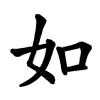Definify.com
Definition 2026
為
為
Translingual
| Stroke order | |||
|---|---|---|---|

| |||
Han character
為 (radical 86 火+5, 9 strokes, cangjie input 戈大弓火 (IKNF), four-corner 20227)
Descendants
References
- KangXi: not present, would follow page 669, character 10
- Dai Kanwa Jiten: character 18981
- Hanyu Da Zidian: volume 3, page 2198, character 11
- Unihan data for U+70BA
Chinese
| trad. | 為/爲 | |
|---|---|---|
| simp. | 为 | |
Glyph origin
| Historical forms of the character 為
| ||
|---|---|---|
| Oracle bone script | Bronze inscriptions | Large seal script |
 |
 |
 |
Simplified from 爲 (爫 → 丶). In the oracle bone script, it is an Ideogrammic compound (會意) : 又 (“hand”) + 象 (“elephant”) — a hand holding an animal (an elephant or a monkey). The 又 later became 爪 (“hand; claw”). Shuowen Jiezi explained the character to be a representation of the female macaque.
Etymology
The two pronunciations below (“to make; to do; to be”, “for; to; because”) are cognate; the latter is the *–s derivative of the former. Words meaning “to make, to do” often have secondary meanings of “for, as” – compare 作.
Etymology not certain. Starostin compared this word with Tibetan བགྱིད་པ (bgyid pa, “to make, to manufacture”), བགྱི་བ (bgyi ba, “action, deed”), ཡིན (yin, “is, be”) and Burmese ဝေ (we, “to distribute, to share”). Schuessler (2007) listed *ʔaayh (“to give”) (> Khmer ឲ្យ (“to give, to donate”)) and Khmer ធ្វើ (thveu, “to do, to make”), although the vowels do not match.
The graphic representation using monkey or elephant probably stems a homophonic or near-homophonic etymon which was rarely attested; compare Proto-Sino-Tibetan *b/g-woj-n > Jingpho woi (“monkey”) and possibly 猿 (OC *ɢʷan, “ape”). Outside Sino-Tibetan, compare Proto-Vietic *-vɔːj (“elephant”) > Vietnamese voi (“elephant”).
Pronunciation 1
- Mandarin
- Cantonese (Jyutping): wai4
- Hakka (Sixian, PFS): vì
- Min Dong (BUC): ùi / ôi
- Min Nan (POJ): ûi
- Wu (Wiktionary): hhue (T3)
- Mandarin
- (Standard Chinese, Beijing)+
- Pinyin:
- Zhuyin: ㄨㄟˊ
- Wade-Giles: wei2
- Gwoyeu Romatzyh: wei
- IPA (key): /u̯eɪ̯³⁵/
-

- (Standard Chinese, Beijing)+
- Cantonese
- (Standard Cantonese, Guangzhou)+
- Jyutping: wai4
- Yale: wàih
- Cantonese Pinyin: wai4
- IPA (key): /wɐi̯²¹/
- (Standard Cantonese, Guangzhou)+
- Hakka
- (Sixian, incl. Miaoli and Meinong)
- Pha̍k-fa-sṳ: vì
- Hakka Romanization System: viˇ
- Hagfa Pinyim: vi2
- IPA: /vi¹¹/
- (Sixian, incl. Miaoli and Meinong)
- Min Dong
- (Fuzhou)
- Bàng-uâ-cê: ùi / ôi
- IPA (key): /ui⁵³/, /uɔi²⁴²/
- (Fuzhou)
- Min Nan
- (Hokkien)
- Pe̍h-ōe-jī: ûi
- Tâi-lô: uî
- Phofsit Daibuun: uii
- IPA (Xiamen): /ui²⁴/
- IPA (Quanzhou): /ui²⁴/
- IPA (Zhangzhou): /ui¹³/
- IPA (Taipei): /ui²⁴/
- IPA (Kaohsiung): /ui²³/
- (Hokkien)
- Wu
- (Shanghainese)
- Wiktionary: hhue (T3)
- IPA (key): /ɦɯᴇ²³/
- (Shanghainese)
| Rime | |
|---|---|
| Character | 為 |
| Reading # | 1/1 |
| Initial (聲) | 云 (35) |
| Final (韻) | 支 (14) |
| Tone (調) | Level (Ø) |
| Openness (開合) | Closed |
| Division (等) | Chongniu III |
| Fanqie | 薳支切 |
| Reconstructions | |
| Zhengzhang Shangfang |
/ɦˠiuᴇ/ |
| Pan Wuyun |
/ɦʷᵚiɛ/ |
| Shao Rongfen |
/ɣiuɛ/ |
| Edwin Pulleyblank |
/ɦjwiə̆/ |
| Li Rong |
/ɣjue/ |
| Wang Li |
/ɣǐwe/ |
| Bernard Karlgren |
/wie̯/ |
| Expected Mandarin Reflex |
wéi |
| Baxter-Sagart system 1.1 (2014) | |
|---|---|
| Character | 為 |
| Reading # | 1/2 |
| Modern Beijing (Pinyin) |
wéi |
| Middle Chinese |
‹ hjwe › |
| Old Chinese |
/*ɢʷ(r)aj/ |
| English | make, do, act as |
Notes for Old Chinese notations in the Baxter-Sagart system: * Parentheses "()" indicate uncertain presence; | |
| Zhengzhang system (2003) | |
|---|---|
| Character | 為 |
| Reading # | 1/2 |
| Phonetic component |
爲 |
| Rime group |
歌 |
| Rime subdivision |
1 |
| Corresponding MC rime |
爲 |
| Old Chinese |
/*ɢʷal/ |
| Notes | 俗爲字 |
Definitions
為
- to do; to make
- (to turn, to transform) into; to
- 分為 / 分为 ― fēnwèi ― to divide into, to split into
-
- 那兩個組織已合併為一個組織。 [MSC, trad.]
- 那两个组织已合并为一个组织。 [MSC, simp.]
- Nà liǎng ge zǔzhī yǐ hébìng wéi yī ge zǔzhī. [Pinyin]
- Those two organizations have been amalgamated into single one.
-
- 它將重新結晶為原來的結構。 [MSC, trad.]
- 它将重新结晶为原来的结构。 [MSC, simp.]
- Tā jiāng chóngxīn jiéjīng wéi yuánlái de jiégòu. [Pinyin]
- It will recrystallize into the original structure.
- 他被晉升為上校。 / 他被晋升为上校。 ― Tā bèi jìnshēng wéi shàngxiào. ― He was promoted to colonel.
- to be (equivalent to, equal to)
- to take something as
-
- 亦以皮為麻。 [Classical Chinese, trad.]
- 亦以皮为麻。 [Classical Chinese, simp.]
- From: Tang Dynasty, Fan Chuo, Manshu, chapter 7, part 7
- yì yǐ pí wèi má. [Pinyin]
- ...its skin can also be used as fabric.
-
- to act as; to serve as; to behave as
- as (in the capacity of)
Compounds
|
|
|
Pronunciation 2
- Mandarin
- Cantonese (Jyutping): wai6
- Hakka (Sixian, PFS): vi
- Min Dong (BUC): ôi
- Min Nan (POJ): ūi
- Wu (Wiktionary): hhue (T3)
- Mandarin
- (Standard Chinese, Beijing)+
- Pinyin:
- Zhuyin: ㄨㄟˋ
- Wade-Giles: wei4
- Gwoyeu Romatzyh: wey
- IPA (key): /u̯eɪ̯⁵¹/
-

- (Standard Chinese, Beijing)+
- Cantonese
- (Standard Cantonese, Guangzhou)+
- Jyutping: wai6
- Yale: waih
- Cantonese Pinyin: wai6
- IPA (key): /wɐi̯²²/
- (Standard Cantonese, Guangzhou)+
- Hakka
- (Sixian, incl. Miaoli and Meinong)
- Pha̍k-fa-sṳ: vi
- Hakka Romanization System: vi
- Hagfa Pinyim: vi4
- IPA: /vi⁵⁵/
- (Sixian, incl. Miaoli and Meinong)
- Min Dong
- (Fuzhou)
- Bàng-uâ-cê: ôi
- IPA (key): /uɔi²⁴²/
- (Fuzhou)
- Min Nan
- (Hokkien)
- Pe̍h-ōe-jī: ūi
- Tâi-lô: uī
- Phofsit Daibuun: ui
- IPA (Xiamen): /ui²²/
- IPA (Quanzhou): /ui⁴¹/
- IPA (Zhangzhou): /ui²²/
- IPA (Taipei): /ui³³/
- IPA (Kaohsiung): /ui³³/
- (Hokkien)
- Wu
- (Shanghainese)
- Wiktionary: hhue (T3)
- IPA (key): /ɦɯᴇ²³/
- (Shanghainese)
| Baxter-Sagart system 1.1 (2014) | |
|---|---|
| Character | 為 |
| Reading # | 2/2 |
| Modern Beijing (Pinyin) |
wèi |
| Middle Chinese |
‹ hjweH › |
| Old Chinese |
/*ɢʷ(r)aj-s/ |
| English | for, because |
Notes for Old Chinese notations in the Baxter-Sagart system: * Parentheses "()" indicate uncertain presence; | |
| Zhengzhang system (2003) | |
|---|---|
| Character | 為 |
| Reading # | 2/2 |
| Phonetic component |
爲 |
| Rime group |
歌 |
| Rime subdivision |
1 |
| Corresponding MC rime |
爲 |
| Old Chinese |
/*ɢʷals/ |
Definitions
為
- for; to
-
- 我能為你做點什麼嗎? [MSC, trad.]
- 我能为你做点什么吗? [MSC, simp.]
- Wǒ néng wèi nǐ zuò diǎn shénme ma? [Pinyin]
- What can I do for you?
- 我真為你高興! / 我真为你高兴! ― Wǒ zhēn wèi nǐ gāoxìng! ― I am really happy for you!
-
- 他為自己的錯誤道歉。 [MSC, trad.]
- 他为自己的错误道歉。 [MSC, simp.]
- Tā wèi zìjǐ de cuòwù dàoqiàn. [Pinyin]
- He gave an apology for his mistake.
-
- because of
- for the sake of
Compounds
|
Japanese
Kanji
(common “Jōyō” kanji, shinjitai kanji, kyūjitai form 爲)
- This term needs a translation to English. Please help out and add a translation, then remove the text
{{rfdef}}.
Readings
- On: い (i) > ゐ (wi)
- Kun: ため (tame), なる (為る, naru), なす (為す, nasu), する (為る, suru), たり (tari), つくる (為る, tsukuru), なり (nari)
- Nanori: びい (bii)
Noun
Usage notes
The kana writing is preferred over the kanji spelling.
Verb
為 (irregular conjugation, hiragana す, romaji su)
- to do
Derived terms
- 為る (suru)